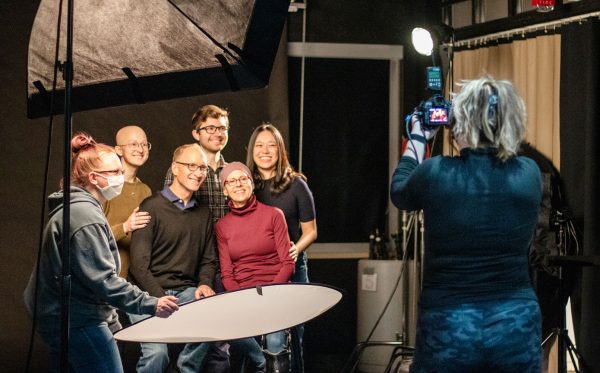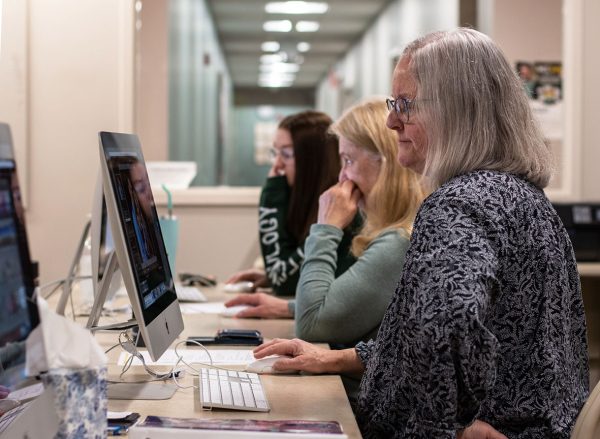

Patient Julie Brabbs and her family pose as volunteers take photos. Ruby Go | Washtenaw Voice
by Grace Crandall
Staff Writer
Weekends are usually quiet on WCC’s campus. But on Saturday, March 18, the campus was a center of activity as volunteers gathered in WCC’s photography studio to prepare for the Life Images event, a portrait session offered to patients and families from the Rogel Cancer Center of University of Michigan (U-M).
In a partnership with WCC Digital Media Arts department, the Rogel Cancer Center offers photoshoots at no cost to cancer patients, sending them home with both printed photos and a flash drive with a photo collection. Life Images is a biannual event, with one session hosted in spring, and one in fall.
As volunteers arrived and introduced themselves, Madison McTevia, a child life specialist at the Rogel Cancer Center, reminded everyone that the event was not about “people with cancer”, but rather about giving patients an opportunity to just be themselves with their families.
“They’re not walking into here as a Rogel Cancer Center patient, but as, ‘I am a mother,’ ‘I am a spouse,’ or, ‘This is my family,’ and they’re being captured in their organic selves,” said McTevia. “I think that’s so powerful for them to have that remembrance of this time, wherever they are in their cancer treatment or experience, just to document and memorialize that.”
Volunteers prepared for the sessions by adjusting studio lights, taping down wires, and testing the cameras. Three lightboxes were arranged, each with a different background to add variety to the shoot.
Rogel Cancer Center staff stood at the door to welcome the families and to offer any needed assistance, as well as provide a familiar face.
Patients and their families arrived at staggered times, allowing photographers and assistants to focus on each family as long as needed. After the shoot, the photos were uploaded to a computer, where student volunteers worked on post-production.


Volunteers work on the post production and print of the photos. Ruby Go | Washtenaw Voice
Life Images is a volunteer based, donor funded event, made up of U-M staff and WCC staff, as well as WCC students. WCC students in the Digital Media Arts program assist in taking photos as well as post production and printing. Along with current WCC students, some volunteers work through U-M Volunteer Services.
Stephanie Prechter is one such volunteer. Prechter began as an intern through WCC’s Digital Media Arts program. Prechter would spend her time at the Rogel Cancer Center, recording cancer patients’ journeys through photography. Prechter’s time spent with cancer patients solidified her passion for making the arts, like photography, a bigger part of healthcare. Prechter, now volunteering through U-M, comes back to WCC to continue coordinating Life Images. For Prechter, events such as Life Images are significant ways to improve one’s mental healing process.
“People then view the arts as something more than ‘art in a gallery.’ It elevates it in a way that promotes healing,” said Prechter.
Only three students after Prechter were able to experience the photography internship, due to COVID-19 putting the internship to a halt. Prechter hopes that WCC will one day resume the internship.
“To be able to get that opportunity is a game changer,” said Prechter.
Prechter now coordinates the Life Images event, but she made sure to mention that coordinating is not a one-man job. Staff and volunteers from both WCC and U-M make this event possible.
Don Werthmann, WCC photography instructor, and Donna Murphy, director of Family Patient Support Services at the Rogel Cancer Center, have been part of the process since its beginning. The cancer center reached out to WCC, interested in partnering with the Digital Media Arts department due to the photography program’s good reputation, said Murphy.
When the sessions began in 2013, they were held on site of the cancer center. Murphy recalled that the room would allow photographers to capture only 2-3 people in a shot. After several sessions in this small space, they decided to move the event to WCC.
“The power of integration of that partnership with WCC has made these photoshoots more robust and amazing,” said Murphy.
Since then, the event has only grown. Ten to 12 slots are offered during each event, making a total of 24 each year.
“The Family Patient Support Services put out an invite to the patients,” said Devyn Baker, who manages the event and contacts patients. “It filled up within a day – all 12 slots.”
There have been times when coordinators have added slots due to patient demand, Baker said.
While the program has continued to grow and reach a greater demand, the goal remains the same: to give patients a memorable family portrait. Patients are encouraged to submit feedback on their session as well.
One patient, Julie Brabbs, is the Chief Administrative Officer of the Rogel Cancer Center. Brabbs shared her experience of being photographed with her family.
“The interaction with the photographers was really special, (they had an) ability to bring us together as a family and capture those moments. I think they were really skilled at helping to make that happen.”
Meals were longtime tradition at monthly meetings Lily Cole | Editor The long-standing, but little-known…
Abigail Gibb | Contributor President Donald Trump has signed over 100 executive orders since the…
Beck Elandt | Staff Writer Photos by Courtney Prielipp While artificial intelligence can produce a…
Recent attacks against Diversity, Equity and Inclusion (DEI) initiatives from the Donald Trump administration have…
Sasha Hatinger | Staff Writer News is available to be consumed in a diverse selection…
This review may contain spoilers for “Mickey 17”, released in theatres on March 7, 2025. …